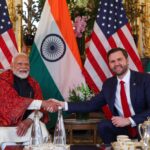In a forceful speech titled “In Defense of the Courts and the University,” at Yale Law School on April 15, 2025, Indian American Congressman Ro Khanna (CA-17) sharply criticized Vice President JD Vance for urging former President Donald Trump to defy the Supreme Court and for characterizing elite universities, including his alma mater Yale, as adversaries of American values.
Khanna directly addressed Vance’s rhetoric, pushing back against his portrayal of university students as being indoctrinated against American ideals.
“He claims that you here at Yale are being corrupted — taught to reject American values — as if he alone possesses the authority to define what it means to be an American, as if the life of the mind is to be excised from our nation’s story,” Khanna told a packed audience of students and faculty. “How far we have fallen from the days when Thomas Jefferson chose not to list the presidency on his epitaph, but instead the founding of a university.”
The Congressman also condemned Vance’s stance on immigration enforcement, particularly his defense of the deportation of Kilmar Abrego Garcia to a notorious prison in El Salvador. Khanna emphasized that the deportation was acknowledged by the administration itself as an “administrative error,” yet Vance supported it.
He emphasized that in J.D. Vance’s vision of America, authorities can deport immigrants without due process, even to dangerous regimes, and then deny responsibility once they’re gone. This happened to Abrego and 19-year-old Venezuelan Merwil Gutierrez, who may have had no criminal record and is now missing, while his devastated father searches for him.
Khanna denounced Vance’s disregard for constitutional principles and his assertion that the President could defy the Supreme Court if he disagreed with its rulings.
“JD Vance, your cold indifference to the lives of vulnerable immigrants mocks every principle that this law school was built to uphold,” Khanna stated. He warned that Vance’s suggestion that “the President, as a co-equal, may simply ignore the Court’s judgment of the law” represents a dangerous departure from democratic norms.
“Your affiliation with this law school is now a stain on the degree of every Yale graduate. I hope Yalies –alumni, student, faculty and administrators will have the moral clarity to say so plainly,” he added.
Khanna explained that his return to Yale was not driven by nostalgia. “My return today is not one of nostalgia for good pizza or to relive faded dreams,” he said. “I chose to come to Yale at a serious moment in the life of our Republic because the Woodward Report, issued by this very institution in 1974, defines the paramount duty of the American university: the defense of free expression and free inquiry.”
He warned of a rising authoritarian impulse in American society, a “mobocratic spirit” that threatens constitutional governance and intellectual freedom.
He noted that historically, American power has been constrained by the Constitution and the enduring strength of civil discourse. But today, he said, public anger, stoked by war, economic stagnation, and anxiety over immigration, is being weaponized not to reform institutions, but to dismantle them.
“But today, a great anger grips the public — burned by years of war, wearied by economic stagnation, and fearful that the foreign-born among us now comprise a larger share of our population than at any point in a century,” Khanna said. “From this disquiet rises not a call to reform, but to dismantle — to cast off the judges in their robes, the scholars in their gowns, and the press with its inconvenient questions.”
He called on university presidents to rise to the moment, invoking past academic leaders who defended academic freedom and moral leadership in times of political pressure.
“I hope university presidents will find their voice, pledging mutual support to each other, by remembering leaders like Yale’s Kingman Brewster, who stood with student protestors even when donors withdrew their support; Harvard’s James Conant, who resisted McCarthyism in the face of pressure from government and alumni; and Chicago’s Robert Hutchins, who defended the independence of scholarship against the demands of powerful business interests,” he said.
Khanna pointed out that their legacies were not defined by the size of their endowments, but by the principles they refused to abandon.






